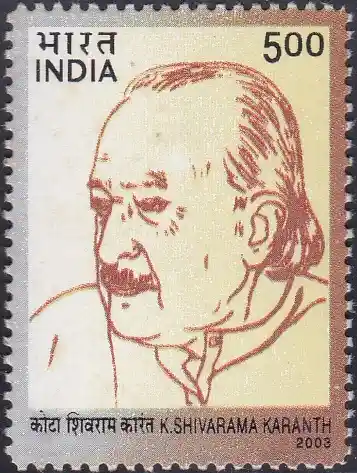Tagore of South
Shivaram Karanth was a literary legend and a multifaceted genius. He lived a dynamic life away from the conformism of society. He was a novelist, playwright, and ecological conservationist and he participated in India's struggle for freedom. His work was as dynamic as his life. He wrote for every age group, from children’s books to novels highlighting the unfairness of society. He was a dynamic man who lived a life full of possibilities

Karnath in 2003 Stamp of India. Image Source: Wikimedia Commons
Kota Shivaram Karnath was born on 10th October 1902 in the Udupi district of Karnataka, As a young man, Karnath was deeply inspired by Gandhi’s ideas and took part in the Indian Independence movement. His participation in the Non-cooperation movement cost him his degree and he quit college in February 1922. Inspired by Gandhi he worked tirelessly canvassing for the khadi and swadeshi movement which was being led in Karnataka by Karnad Sadashiv Rao of the Indian National Congress. Karnath’s anti-authority mindset was in some part result of his participation against British authority in his young days.
He started his writing career in 1924 and dealt with themes of poverty, injustice, and the struggle of those who fight an uphill battle against society. All of his 3 dozen novels can be turned into a stellar screenplay and some of them have. “Choman Dudi (1975)” is a movie about an untouchable bonded labour and the tragedies of his life, based on his book by the same name won the National Film Award for the Best feature film in 1975. ‘Devaddhootaru (1928) **a satire on contemporary India is considered his magnum opus., He also wrote Nirbhagya Janma, Sooleya Samsara, Marali Mannige, Bettada Jeeva, Alida Mele, Mookajjiya Kanasugalu, Mai Managala Suliyalli, Ade OOru Ade Mara, Shaneeshwarana Neralinalli, Kudiyara Koosu, Svapnada Hole, Sarsammana Samadhi, and Chomana Dudi which are widely popular and considered gems of Kannada literature.
Karnath also wrote two books on the ancient Kannada dance-drama tradition Yakshaganga. He played a pivotal role in reviving this tradition and in a letter he wrote to his friend H.Y. Prasad, just a week before his death, he mentioned his plans to visit England with his Yakshagana troupe next summer. At this time Karnath was 95 years old, yet he had neither lost his vigour nor receded to a slow-moving pace of old life. He was just as passionate and full of energy as he was 50 years ago.
In another letter, he wrote he lamented the shortcomings of adult literary programs of the government and talked about the dearth of interesting books for neo-literates. Karanth painted too and he enjoyed reading about science and paintings. Karnath however always remained a child at heart, H.Y. Prasad in his tribute to Karnath, talked about how Karnath would make faces, mimic animals and make jokes. He was a propagator of the scientific outlook and also wrote a science book for children. He followed this by 4 volumes of encyclopedias for adults and children. However, when he approached the Union Ministry of Education for support, he was rebuffed citing that he wasn’t from a scientific background. Karnath believed that if scientists did not write in their mother tongue, somebody had to make science more accessible, pulling it away from elitist English academia. He was also an ecological conservationist and his love for nature never allowed him to live in a big city. Karnath was deeply concerned with the issue of the use of nuclear energy and the effect of nuclear energy waste on the environment. Karnath’s love of nature was carried forward by his son Ullas, who is a conservation zoologist and a leading tiger expert.
Karnath wrote poems and books for children and Prasad mentioned that successive generations of children have grown up reading his writing. Karnath's love for children also motivated him to write a set of textbooks, which were popular all over Karnataka. However when they were scrapped and the argument was given that since Karnath had no degree in education or Kannada, how can his work be considered proper. Karnath went to court and won the case. He was a fearsome litigant, something government and publishing houses very well know.
It’s hard to believe someone can live such a vibrant life, but that’s the life Karnath lived. Ramchandra Guha called him the “Tagore of Modern India” because of his genius. Suniti Kumar Chatterji also remarked that Karnath was next only to Tagore in his many-sided genius. He never really completed his former degree, but his work became the foundation stone of Kannada Literature, He is considered one of the most influential writers in the Kannada language, and rightfully so, the authenticity and depth of his work are unparalleled. Karanth was an agnostic, and he wrote 2 detailed books on agnosticism too. In his biography, he gave detailed reasons for his disillusion with religion. H.Y. Prasad calls him a non-conformist because Karanth’s wisdom didn’t come from books or authorities, he was free from such biases. His wisdom came from observation and contemplation. For him, the world was his storyboard and as he lived, so he wrote.


